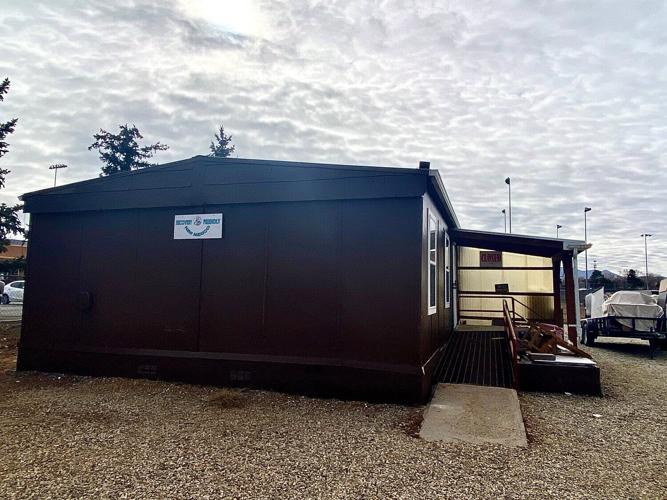It's been about a month since the Taos Men’s Shelter shuttered its doors and the manufactured home that housed it at 220 Albright St. went dark.
A couple weeks ago, however, there was activity inside the humble structure, which received a new coat of paint and some minor repairs. Come Dec. 30, the building will have a new occupant: Recovery-Friendly Taos. The local peer support and substance use recovery program was founded in 2012.
According to Recovery-Friendly Taos’ Community Coordinator, Steve Fuhlendorf, the program will relocate from its location at 412 Sipapu St. and operate Monday through Thursday from 9 a.m. to 4. p.m.
The new location was chosen for its proximity to the Taos County Detention Center, NEST shelter and 8th Judicial District Courthouse. Fuhlendorf said they hope to slow the “revolving door” of the justice system and mitigate recidivism by acting as a go-between with detention center and courthouse staff.
“We want to do what we can to stop that revolving door,” Fuhlendorf said. “We haven’t finalized details on anything yet, but what we’re hoping is that when somebody is released from incarceration, we can get a phone call and be over there to meet them and let them know the resources we have to offer. Now whether they choose to take advantage of that is totally up to them, but at least they'll know these resources are available.”
That could mean entering intensive outpatient therapy, having a conversation with one of Recovery-Friendly Taos’ certified peer support workers, acquiring a social security card or getting on a list for low-income housing.
“So often it’s not addiction that causes homelessness, it’s homelessness that causes addiction,” Fuhlendorf said. “We really need to take a look at that. When somebody is out there on the street, when they have no stable housing, then substance misuse becomes a way to disconnect from the situation and cope with your circumstances.”
Recovery-Friendly Taos provides a variety of services, ranging from peer support groups to art and pottery classes, to acupuncture. Participants can come and go as they please, but must agree to three things: They must be sober for 24 hours prior to arrival, attend a recovery circle every week and find a way to be of service.
“We have recovery circles four days a week, and a couple days we have two of them a day,” Fuhlendorf said. “Those are what I was telling you about where everybody shares their feelings, their goals and such. The third thing is they have to agree to be of service – wash dishes, sweep the floor, take out the trash, whatever it may be. But, they have to be willing to participate and be part of it. What we’ve found is that our participants absolutely love this. They want to be held accountable.”
These services become vital during the holiday season, when substance use tends to skyrocket and people in recovery become more vulnerable to relapse. According to Center for Network Therapy, data, drug and alcohol relapse rates spike 150 percent during the holidays, while organizations like Alcoholics Anonymous and Narcotics Anonymous report higher attendance rates. Relapses can arise from holiday-related stress, family pressure and situations commonly involving drinking, like parties.
“So many people have issues around the holiday season and traditionally, that’s a time to get together, party, drink and do all of that sort of thing,” Fuhlendorf said. “With those that are suffering from substance use disorder, even if they’ve been abstinent for a period of time, the holiday season can be a big trigger for bringing them back into whatever their drug of choice is.”
That also includes binge drinking, which the Center for Disease Control and Prevention defines as four or more drinks for women and five or more drinks for men on a single occasion.
According to the National Highway Traffic Safety Administration (NHTSA), an average 36 fatalities occur every day as a result of inebriated drivers. However, this rises to 45 per day around Christmas and nearly doubles to 54 during New Year’s Eve.
“Part of it is peer pressure,” Fuhlendorf said. “If they’re getting together with friends and family, and everybody else is drinking, they don’t want to be left out of the party.”
Fuhlendorf hopes that Recovery-Friendly Taos’ new location will allow them to continue to be of service to those who need it.
“It’s so that people can get back into that stream of life rather than being stuck in whatever place that they’re in,” he said. “Give them opportunities to build self-esteem and to get back into it. Whether it’s the workforce or whether it's stable housing, there’s so many challenges that are out there.”
















(0) comments
Welcome to the discussion.
Log In
All comment authors MUST use their real names. Posts that cannot be ascribed to a real person
will not be moderated.
Keep it Clean. Please avoid obscene, vulgar, lewd, racist or sexually-oriented language.
PLEASE TURN OFF YOUR CAPS LOCK.
Don't Threaten. Threats of harming another person will not be tolerated.
Be Truthful. Don't knowingly lie about anyone or anything.
Be Nice. No racism, sexism or any sort of -ism that is degrading to another person.
Be Proactive. Use the 'Report' link on each comment to let us know of abusive posts.
Share with Us. We'd love to hear eyewitness accounts, the history behind an article.